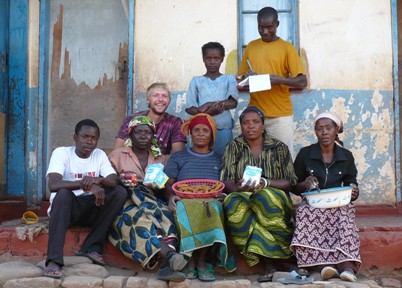Building sustainability in Zambia
Kai Van Horn • MULTIDISCIPLINARY ENGINEERING
In the southern African country of Zambia, you can find the mighty Victoria Falls. Rural subsistence farmers. Wildebeests, elephants, and cheetahs. Upscale metropolitan shopping districts flanking fields of slums. And, taking it all in: Kai Van Horn, the first graduate of Purdue’s integrated engineering concentration within the Multidisciplinary Engineering Program in the School of Engineering Education.

Purdue MDE degree in hand, Van Horn (purple shirt) is working with the Peace Corps before entering graduate school.
Van Horn graduated in 2007, a transfer student from Embry Riddle Aeronautical University who, at Purdue, was able to create an academic plan of study in renewable energy engineering. Eight months after receiving his diploma, he was flying into Lusaka, Zambia’s capital city, as a Peace Corps volunteer. “Ideally,” he says, “my work will be that of capacity-building. I’m focused mostly on identifying the needs of my community, Muyembe, and trying to define effective, sustainable solutions.” Chief among them: a secure food supply.
Sustainability is the byword. “As the world food crisis continues,” Van Horn says, “I hope to address it in Zambia before it becomes a larger issue. It’s important that we help those living in the rural areas to diversify the food supply and become less dependent on hybrid seed and chemical fertilizer.”
The Peace Corps’ LIFE program—“Linking Income, Food, and the Environment”—is promoting “seed multiplication” of open-pollinated varieties of vegetable and staple grains. The program "loans" seeds to farmers who will agree to "pay back" the seed they took after harvest and who will also "loan" to three to five other farmers the following season.
"It's important," says Van Horn, "that we help those living in the rural areas to diversify the food supply."
“The idea is that people will eventually have enough seed to not require the purchase of expensive hybrid seed,” says Van Horn. “To address the use of chemical fertilizer, we are promoting, with the forestry department, the use of agroforestry species intercropping with field crops, as well as practices such as composting and the making of manure teas. This is very important, since a bag of fertilizer capable of covering half a hectare is going for well over 100,000 kwacha [~$30], a price too high for villagers to afford.”
Van Horn’s challenge is to overcome prevailing ideas—that field crops must be grown with fertilizer, for instance—and demonstrate the value of conservation farming and agroforestry techniques. “My pet project,” he says, “is working with an orphanage to improve their garden to the point where it can provide for all of their vegetable needs. I hope by the end of my two years that we can at least help them to become food-secure.”
And what’s in store for Van Horn himself when his term with the Peace Corps ends? Graduate school, with a focus on wind power. “Taking classes at Purdue like ‘Wind Energy Engineering’ and ‘Engineering Environmental Sustainability’ helped me cement the type of work that I want to do,” he says. “I’m very happy that I made the decision to transfer into Purdue's Multidisciplinary Engineering program. It allowed me to focus my studies on the engineering topics that matter most to me.”
Engineering Education at Purdue. LEARNING to Make a DIFFERENCE.
